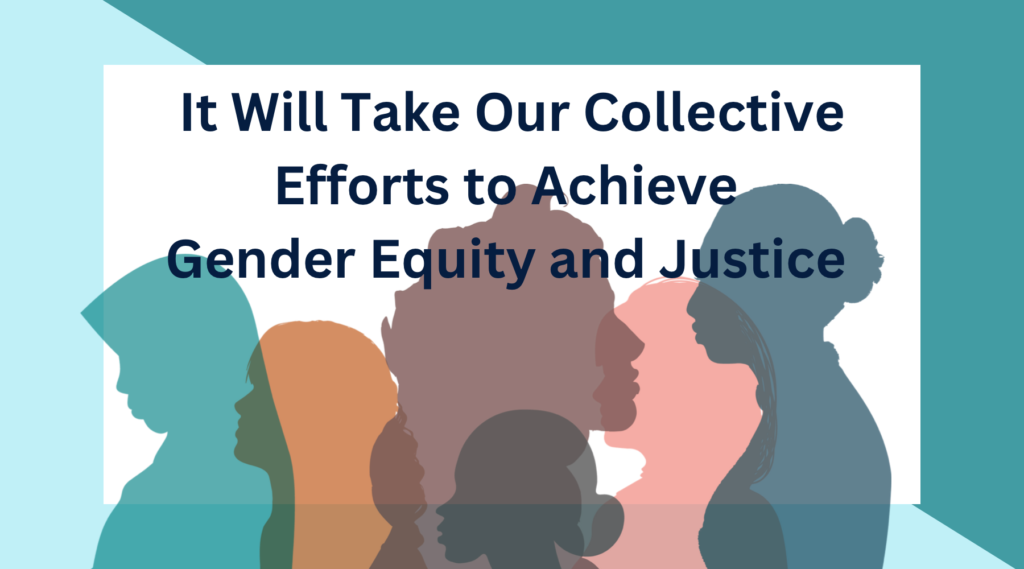By: Abel Koka
The world has witnessed tremendous advancement in advancing gender equity and justice since the adoption of the Beijing Declaration and Platform for Action in 1995. The declaration was passed during the Fourth World Conference on Women and endorsed by 189 countries. It has set a roadmap to advance the rights and well-being of women and girls everywhere in the community. It is a blueprint for an equal, just and developed community with women and girls at the center and front of it. However, 26 years after its adoption, countries are still lagging in addressing the needs and rights of women and girls despite many measures, such as health, education, leadership, and economic empowerment, in narrowing the gender divide between men and women. Nevertheless, as envisioned during the Beijing Conference, progress towards achieving gender equity will be possible if everyone from all corners of the community takes an active role.
Achieving gender equity and justice should be an agenda for everyone in the community, not only women and girls. We should not leave it to decision-makers, members of Non-Governmental Organizations (NGOs) and Civil Society Organizations (CSOs) to decide and advocate for its realization. Everyone in the community has a critical role in disrupting the status quo and systemic barriers, challenging poor social norms and discriminatory practices affecting the attainment of gender justice in the community. We should all engage and advocate for policy formulation, changes and implementation to uphold women and girls agency. Every small action we take from our families and communities to the country level will significantly contribute to the gender equity agenda. But the question might be, how can we actively become part of gender equity and justice activism? We can all become part of the history of finishing the unfinished business of ensuring everyone, especially women and girls have full access to their rights and opportunities by doing the following;
The starting point is to amplify the feminist voices by ensuring it is well heard, counted and acted upon. Feminist voices are a powerful weapon to disrupt discriminatory systems and challenge social and cultural practices undermining women’s and girls’ rights. However, these voices have been ignored and shut down by decision-makers and robust structures in the community, such as the patriarchal system, for so long. Feminist voices must come to light and reach out to those holding powers in the community to heed the demand of women and girls. The only way we can make it possible is for all of us to stand at the helm and amplify, among others, the voices demanding equal pay, an equal share of unpaid work, increased participation in leadership, access to improved reproductive services and equal access to quality education for girls. Our collective efforts and voices will guarantee a community whereby women and men and boys and girls enjoy equal rights and opportunities without any discrimination, which benefits all of us.
Moreover, sharing our lived realities is very powerful in inspiring the current and future generations to join the fight for gender equity. For instance, how many young people know the work of the Beijing Veterans who jumped many hurdles from all corners of the community to bring us the Beijing Declaration and Platform for Action? Some live with us in the community, but their testimonies are untold. We must find a way to amplify their stories to inspire and unlock people’s interest to be torchbearers of advocating for the rights and needs of women and girls to be addressed. In addition, we should use community platforms and our movements through digital media to share stories and evidence of our leadership to bridge the gender gaps. Doing so will mobilize community support and galvanize their action.
Furthermore, collaboration and networking should form a critical basis for our activism and engagement in addressing gender inequalities in the community. It has been said, and I wish to reiterate, that progress in achieving gender equity will not be possible by working in silos. Individuals, NGOs, CSOs, Philanthropies and others must recognize the importance of coming together and collaborating to push against all the pushback. We should share resources, expertise and best practices to push this agenda forward instead of doing the same thing the same way and expecting sustainable results. “Alone, you can go faster, but we can go further together.”
Therefore, gender justice means improving the lives of everyone in the community, not only women and girls. Gender equity is the language of the day. Everyone in the community, men and boys as women and girls, must be fluent in it to achieve sustainable development for all. We must all feel comfortable supporting women’s and girls’ rights as we do for men and boys. We must encourage each other to march forward, engage in dialogues and take any action to push for the realization of gender equity and justice for all. As a community, we need everyone to be a gender equity broker. Gender equity and justice are possible and in our hands to make them a reality.

Abel Koka is a gender equality activist from Tanzania. He is pursuing a Master in Peace and Conflict Studies at the University of Manitoba, Canada. Abel is serving as Senior Program Officer with End Child Abuse and Neglect Tanzania (ECAN (T)), where he is unlocking the power of young people, adolescent girls and young women, to realize their potential and be the change they want to see in the community. In addition, he is volunteering as a member of the Leadership Steering Committee with Canadian Women in Global Health (CWIGH) and a member of the Institute for International Women’s Rights – Manitoba (IIWR-MB). Abel is passionate about unleashing the potential and amplifying the voices of young people, women and girls to be at the front and centre of creating an equal, just, developed, peaceful and prosperous community.
Facebook: http://facebook.com/abel.koka.7
Twitter: https://twitter.com/KokaAbel
LinkedIn: http://www.linkedin.com/in/AbelKoka
YouTube: https://bit.ly/38aRM1D

